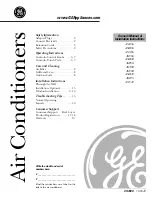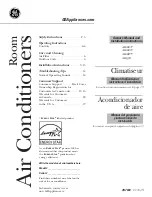
[
X
Troubleshooting ]
- 192 -
HWE10190
GB
[4] Troubleshooting Principal Parts
-1- High-Pressure Sensor (63HS1)
1. Compare the pressure that is detected by the high pressure sensor, and the high-pressure gauge pressure to check
for failure.
By configuring the digital display setting switch (SW1) as shown in the figure below, the pressure as measured by the high-
pressure sensor appears on the LED1 on the control board.
(1) While the sensor is stopped, compare the gauge pressure and the pressure displayed on self-diagnosis LED1.
1) When the gauge pressure is between 0 and 0.098MPa [14psi], internal pressure is caused due to gas leak.
2) When the pressure displayed on self-diagnosis LED1 is between 0 and 0.098MPa [14psi], the connector may be defective or
be disconnected. Check the connector and go to (4).
3) When the pressure displayed on self-diagnosis LED1 exceeds 4.15MPa [601psi], go to (3).
4) If other than 1), 2) or 3), compare the pressures while the sensor is running. Go to (2).
(2) Compare the gauge pressure and the pressure displayed on self-diagnosis LED1 while the sensor is running. (Com-
pare them by MPa [psi] unit.)
1) When the difference between both pressures is within 0.098MPa [14psi], both the high pressure sensor and the control board
are normal.
2) When the difference between both pressures exceeds 0.098MPa [14psi], the high pressure sensor has a problem. (perfor-
mance deterioration)
3) When the pressure displayed on self-diagnosis LED1 does not change, the high pressure sensor has a problem.
(3) Remove the high pressure sensor from the control board to check the pressure on the self-diagnosis LED1.
1) When the pressure displayed on self-diagnosis LED1 is between 0 and 0.098MPa [14psi], the high pressure sensor has a
problem.
2) When the pressure displayed on self-diagnosis LED1 is approximately 4.15MPa [601psi], the control board has a problem.
(4) Remove the high pressure sensor from the control board, and short-circuit between the No.2 and 3 connectors
(63HS1) to check the pressure with self-diagnosis LED1.
1) When the pressure displayed on the self-diagnosis LED1 exceeds 4.15MPa [601psi], the high pressure sensor has a problem.
2) If other than 1), the control board has a problem.
2. High-pressure sensor configuration
The high pressure sensor consists of the circuit shown in the figure below. If DC 5V is applied between the red and the black
wires, voltage corresponding to the pressure between the white and the black wires will be output, and the value of this voltage
will be converted by the microcomputer. The output voltage is 0.071V per 0.098MPa [14psi].
The pressure sensor on the body side is designed to connect to the connector. The connector pin number on the body side
is different from that on the control board side.
Body side
Control board side
Vcc
Pin 1
Pin 3
Vout
Pin 2
Pin 2
GND
Pin 3
Pin 1
1 2 3 4 5 6 7 8 9 10
ON
SW1
0
0.5 [73]
1.0 [145]
1.5 [218]
2.0 [290]
2.5 [363]
3.0 [435]
3.5 [508]
4.0 [580]
4.5 [653]
0 0.5 1
1.5 2 2.5 3 3.5
Output voltage (V)
Pressure
(MPa [psi])
Connector
63HS1
1 2 3
1
2
3
GND (Black)
Vout (White)
Vcc (DC 5 V)(Red)
Pressure 0 ~ 4.15 MPa [601psi]
Vout 0.5 ~ 3.5 V
0.071 V / 0.098 MPa [14 psi]
0000002115.book 192 ページ 2011年6月4日 土曜日 午前10時48分
Summary of Contents for PUHY-P250YJM-A
Page 1: ......
Page 11: ... 2 HWE10190 GB ...
Page 25: ... 16 HWE10190 GB ...
Page 45: ... II Restrictions 36 HWE10190 GB ...
Page 47: ... 38 HWE10190 GB ...
Page 57: ... 48 HWE10190 GB ...
Page 69: ... IV Indoor Unit Components 60 HWE10190 GB ...
Page 71: ... 62 HWE10190 GB ...
Page 73: ... V Remote Controller 64 HWE10190 GB ...
Page 75: ... 66 HWE10190 GB ...
Page 83: ... 74 HWE10190 GB ...
Page 91: ... VII Refrigerant Circuit 82 HWE10190 GB ...
Page 93: ... 84 HWE10190 GB ...
Page 115: ... VIII Control 106 HWE10190 GB ...
Page 117: ... 108 HWE10190 GB ...
Page 137: ... 128 HWE10190 GB ...
Page 225: ... X Troubleshooting 216 HWE10190 GB ...
Page 227: ... 218 HWE10190 GB ...
Page 272: ......
















































